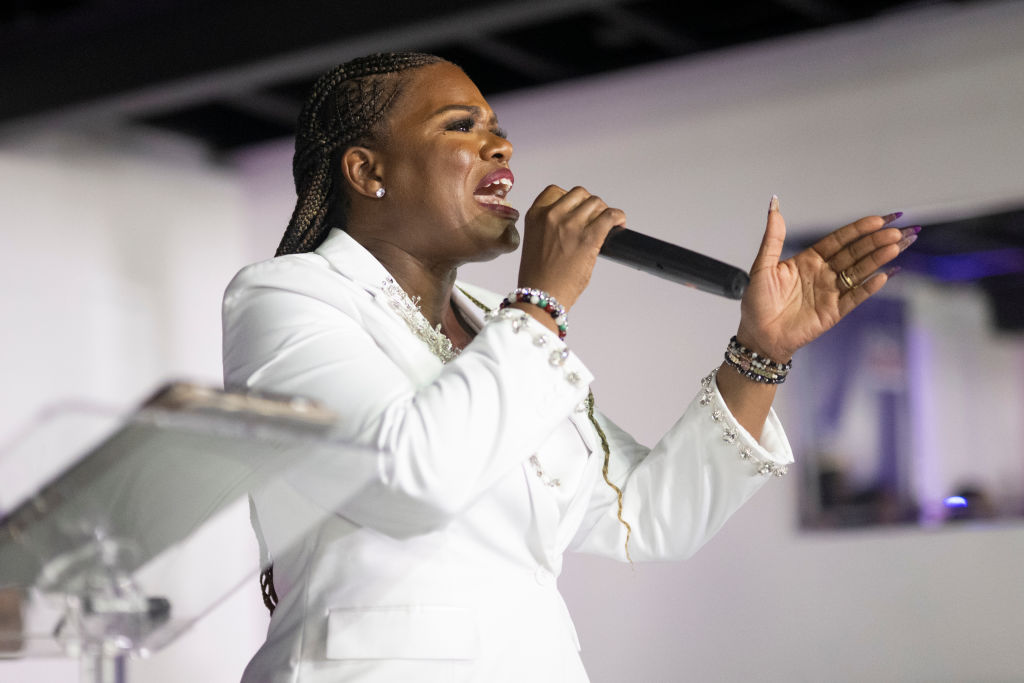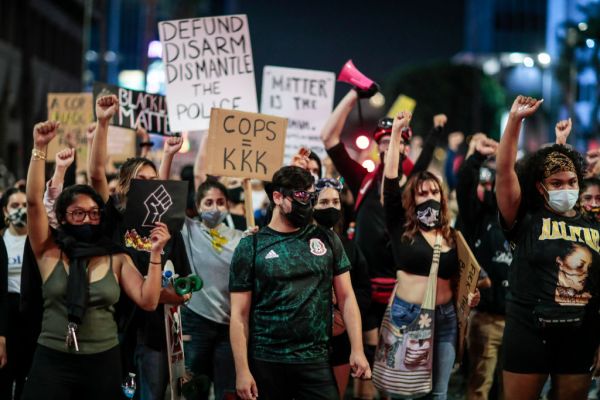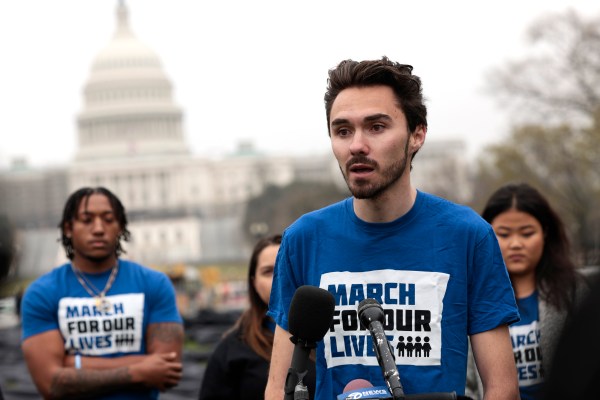Cori Bush was not a happy warrior.
The second Squad member to be ousted by Democratic primary voters this year, the Missouri congresswoman was bitter and defiant in defeat. In striking contrast to the “joyful” vibes at the top of the Democratic ticket, Bush promised vengeance against the pro-Israel groups she blamed for her defenestration.
“All they did was radicalize me, so now they need to be afraid,” she declared Tuesday night. “They are about to see this other Cori, this other side,” she said before directly addressing the American Israel Public Affairs Committee, a pro-Israel group that backed her opponent. “AIPAC, I’m coming to tear your kingdom down.”
It was unclear how she intended to do that.
Bush was handily defeated in the high-profile primary by St. Louis County District Attorney Wesley Bell, and she follows Jamaal Bowman—a fellow member of the progressive Squad that also includes Reps. Alexandria Ocasio-Cortez, Rashida Tlaib, and Ilhan Omar—into involuntary retirement. On the eve of his own defeat in June, Bowman also launched an angry rant against AIPAC.
“We are gonna show f—ing AIPAC the power of the motherf—ing South Bronx!” Bowman shouted during a rally headlined by Ocasio-Cortez.
Bowman lost by nearly 17 points to fellow Democrat George Latimer after the most expensive primary campaign for a House seat in American history.
But it was Bush’s defeat that highlighted the apparent cognitive dissonance in the Democratic Party.
On Tuesday, the same day Bush lost her race, progressives in the party cheered Kamala Harris’ choice of Minnesota Gov. Tim Walz as her running mate—bypassing Pennsylvania Gov. Josh Shapiro, who had drawn the ire of the party’s anti-Israel left. Progressives looked triumphant and ascendant, just hours before Bush made their alienation from the party’s mainstream clear with her angry display.
Remarking on the mixed message, Josh Kraushaar, the editor-in chief of Jewish Insider, noted that the controversy over Shapiro demonstrated that “pockets of anti-Israel activism within the party are now a factor that any Democrat (Jewish or not) has to confront.” But Tuesday’s primary, in which actual Democratic votes were cast, “also shows that these radical voices, disproportionately represented among young Americans, are still a small minority within the party.”
Indeed, these are muddled days for the progressive left and its anti-Israel wing. While many regard Harris-Walz as a dream ticket, both Harris and Walz have solid records of support for Israel. As Kraushaar noted, Walz’s record in Congress—he served in the House from 2007 to 2019—and as governor has been solidly supportive of Israel. At an AIPAC conference, Walz called Israel “our truest and closest ally in the region, with a commitment to values of personal freedoms and liberties, surrounded by a pretty tough neighborhood.”
In June, Walz declared: “The ability of Jewish people to self-determine themselves is foundational. … The failure to recognize the state of Israel is taking away that self-determination. So it is antisemitic.”
During campus protests this year, Walz defended Jewish students. “I think when Jewish students are telling us they feel unsafe in that, we need to believe them, and I do believe them,” he said. “Creating a space where political dissent or political rallying can happen is one thing. Intimidation is another.”
While left-wing activists freely tossed around epithets about “Genocide Joe [Biden]” and “Genocide Josh [Shapiro],” drawing a comparison between the war in Gaza and the Nazi atrocities of World War II, Walz actually wrote a master’s thesis in which he urged greater attention to teaching about the actual Holocaust.
Contrast that with the rhetoric of the ousted Squad members.
After the October 7 attack on Israel by Hamas, Bush refused to call Hamas a terrorist group, suggesting instead that there was some sort of moral equivalency between Hamas and Israel. “Have they hurt people?” she asked of the terror group. “Absolutely. Has the Israeli military hurt people? Absolutely.”
Despite mounting evidence, Bowman claimed that reports of systematic sexual violence by Hamas against Israel were “propaganda” and “lies.” While he later walked back those comments, he accused Israel of waging an “ethnic cleansing campaign” and “collective punishment against Palestinians for Hamas’s actions.” Days before his primary defeat, Bowman escalated his rhetoric. “We are not gonna stay silent while the U.S. tax dollar kills babies and women and children,” he told rallygoers. “My opponent supports genocide. My opponent and AIPAC are the ones destroying our democracy.”
Meanwhile the progressive left’s losing streak—in local Democratic primaries—continues. After a smattering of early victories, progressive-backed candidates lost all but one of their challenges against moderate incumbents in 2022. (According to 538, the progs won just one of 11 in races for the House, Senate, and governor.)
Democratic voters also appear to be turning against soft-on-crime politicians and prosecutors. Bush was one of her party’s most outspoken advocates for “defunding the police” and insisted on using the slogan, despite having her own private security detail. It is not a coincidence that she was defeated by a local prosecutor.
Voters have also soured on progressive prosecutors, even in solidly blue areas. In 2022, Democratic voters in San Francisco ousted left-wing District Attorney Chesa Boudin in a recall election. In May, Democrats in the ultra-woke Portland area voted out their progressive district attorney, Mike Schmidt. And, as Politico notes, soft-on-crime prosecutors throughout the West Coast—including Alameda County DA Pamela Price and Los Angeles County DA George Gascón—find themselves under siege.
This push-pull between the party’s center-left and far-left is likely to be on display at the upcoming Democratic National Convention, at least outside the convention hall.
Those tensions flared Wednesday in Michigan, when anti-Israel protesters briefly disrupted Kamala Harris’ rally speech. Despite Harris’ decision to meet with a pro-Palestinian group before the event, a small gaggle of protesters interrupted her, chanting, “Kamala, Kamala you can’t hide! We won’t vote for genocide.”
Harris tried to be conciliatory. “I’m here because we believe in democracy. Everyone’s voice matters,” she said. “But I am speaking now. I am speaking now.”
But the heckling continued, and Harris’ tone sharpened.
“You know what?” Harris said as she stared down the hecklers, “If you want Donald Trump to win, then say that. Otherwise I’m speaking.”
The crowd roared. The protesters were escorted out.
But they’ll be back, because the fight for the soul of the Democratic Party is far from over. And it won’t necessarily be joyful.









Please note that we at The Dispatch hold ourselves, our work, and our commenters to a higher standard than other places on the internet. We welcome comments that foster genuine debate or discussion—including comments critical of us or our work—but responses that include ad hominem attacks on fellow Dispatch members or are intended to stoke fear and anger may be moderated.
With your membership, you only have the ability to comment on The Morning Dispatch articles. Consider upgrading to join the conversation everywhere.